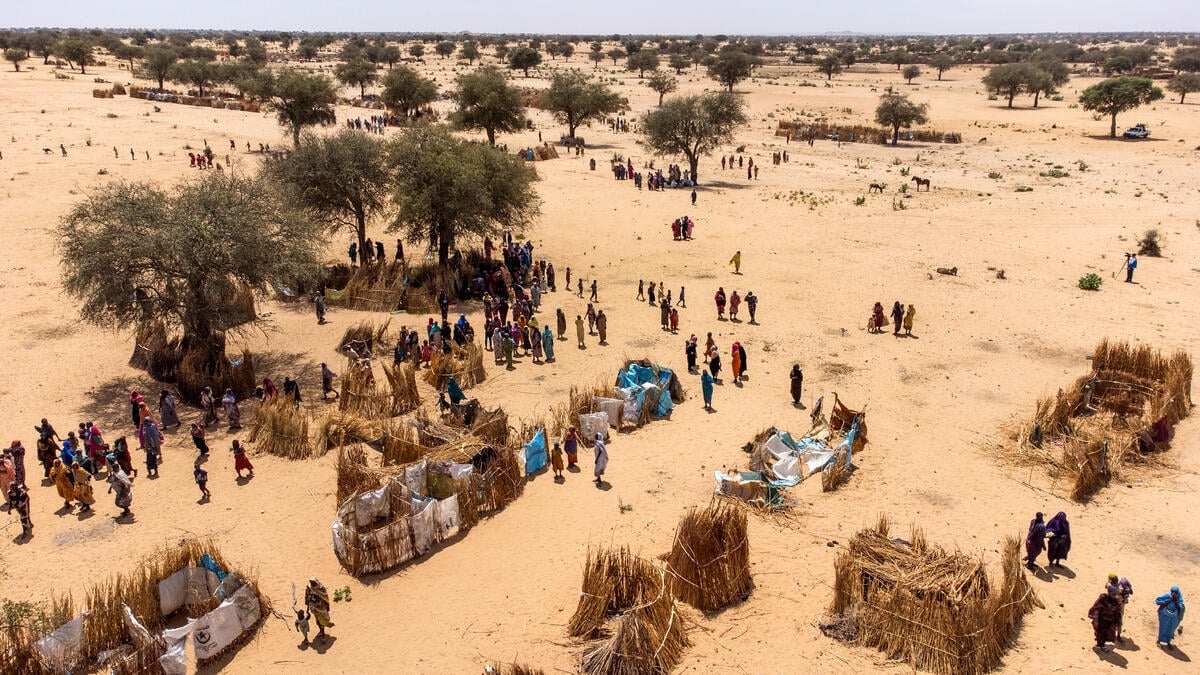UNHCR’s Grandi urges joint action to tackle soaring displacement
UNHCR’s Grandi urges joint action to tackle soaring displacement
UN High Commissioner for Refugees Filippo Grandi delivers his opening statement at UNHCR's annual Executive Committee meeting at the Palais des Nations in Geneva.
Addressing the opening session of UNHCR’s annual Executive Committee meeting in Geneva, the High Commissioner reflected on a year of loss and grief fueled by “the terrible lie that the path to peace is found through war.” The current crisis in the Middle East and ongoing conflicts in Sudan, Ukraine, Myanmar and beyond mean the future “seems more uncertain than ever,” he said.
“Against the backdrop of crisis in the Middle East, it would be easy – and perhaps it is tempting – to become cynical about multilateralism. To turn inwards. But cynicism and isolation are not luxuries that refugees can afford,” Grandi said. “There are 123 million refugees and displaced people today. Their plight demands solutions. And the only way to achieve solutions is by working together.”
Grandi paid tribute to two UNHCR colleagues killed in recent Israeli airstrikes in Lebanon and the 226 UNRWA staff killed since the start of the conflict in Gaza. Despite the growing threat to civilians and aid workers in conflict zones around the world, UNHCR staff would maintain their presence and response, he pledged.
Dwindling resources
Humanitarian funding has failed to keep pace with the rising number of crises worldwide, with UNHCR declaring an average of 40 emergencies annually for the past three years. Grandi gave the example of the war in Sudan – in which more than 11 million people have been displaced over the past 18 months, including more than 2 million refugees – but where the refugee response plan is only 27 per cent funded and prospects for peace remain dismal.
“No peace; little resources – in this lethal equation, something has got to give,” Grandi warned. “Otherwise, nobody should be surprised if displacement keeps growing, in numbers but also in geographic spread. Because the reality is that without a sense of safety and stability, refugees will move on, something so many States are so worried about.”
Watch the video
UNHCR’s overall budget – while an improvement on the “bleak” situation at the start of the year – is still only 45 per cent funded against total requirements of $10.8 billion for 2024, with uncertainty hanging over next year and beyond. “We cannot continue to operate like that. And neither can you. This approach is not sustainable,” Grandi told governments.
Sustainable approaches
One approach offering benefits for displaced people, local communities, host countries and donors is to reduce the current over-reliance on humanitarian aid – especially in protracted situations – in favour of more sustainable approaches to include refugees in local communities and in national systems while they await long-term solutions, such as safe return to their home countries or resettlement elsewhere.
“This model is not about shifting the burden to host countries,” Grandi stressed. “It is about strengthening – including through financial support – the capacities and resilience of host countries and communities so they can successfully, and sustainably, include displaced people in their national response systems for as long as displaced people are there.”
Another challenge requiring fresh approaches is the phenomenon of refugees and others fleeing war, violence and persecution increasingly taking the same dangerous journeys to safety as those moving in search of better economic opportunities. These so-called “mixed flows” of refugees and migrants create challenges for countries and those making the journeys, who face similar significant dangers.
Grandi urged countries not to focus only on their own borders but to promote alternatives to such dangerous journeys. This could include creating more legal pathways to entry – such as resettlement and family reunification – or supporting alternatives to onward movement in transit countries – including legal stay and regularization schemes.
A shift towards such approaches will require significant investments in transit and host countries, Grandi said, adding that whichever pragmatic and principled solutions emerge, UNHCR will continue to forcefully defend the institution of asylum.
Moments of hope
Despite the troubling global backdrop, Grandi pointed to several bright spots amid the gloom with a record 200,000 refugees due to be submitted for resettlement in 2024.
In recent weeks Turkmenistan became the second country after Kyrgyzstan to resolve all known cases of statelessness, following a decade of progress under UNHCR’s #IBelong campaign, during which half a million people have secured legal nationality. On Monday, Grandi launched a new Global Alliance to End Statelessness to build on the success of #IBelong.
He also cited the inspiring example set by the Refugee Olympic and Paralympic athletes who competed in Paris earlier this year, and the five courageous women – one global laureate and four regional winners – who will be honoured at the 2024 Nansen Refugee Awards in Geneva on Monday night.
Returning to the need for collective action to address the current global challenges, Grandi concluded: “I beg you all that we continue to work — together and with humility — to seize every opportunity to find solutions for refugees. And as we do, let us please hold on to hope. The hope that peace will finally come to all those countries where it seems so distant, so impossible.”










